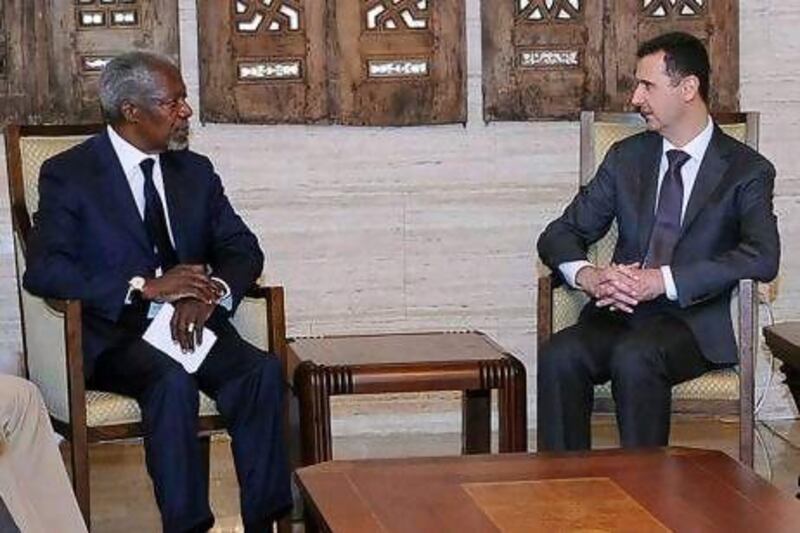DAMASCUS // Most of the 108 victims of the Houla massacre were summarily executed by gunshot at close range, probably by members of a notorious militia that supports the Syrian president Bashar Al Assad.
The United Nations peacekeeping chief Herve Ladsous said the Syrian army and shabbiheh militia were probably jointly responsible for the bloodshed, with 20 of the dead killed by artillery fire and the rest with personal firearms and knives.
"Some of the victims had been killed by artillery shells; now that points ever so clearly to the responsibility of the government. Only the government has heavy weapons, has tanks, has howitzers," Mr Ladsous said in New York.
"But there are also victims from individual weapons, victims from knife wounds, and that of course is less clear but probably points the way to the shabbiheh, the local militia."
The Syrian government has denied any involvement in the atrocity, and says "terrorists" allied with the opposition were responsible.
Rupert Colville, spokesman for the UN High Commissioner for Human Rights, said evidence collected from Houla residents by UN investigators indicated shabbiheh were to blame but that it was not yet possible to independently confirm.
"What is very clear is this was an absolutely abominable event that took place in Houla, and at least a substantial part of it was summary executions of civilians, women and children," Mr Colville said.
In protest at the killings, Syrian diplomats were expelled yesterday by the United States, France, Britain, Germany, Italy, Spain, Canada, Switzerland and Australia.
Russia, a key Syrian ally, said the UN should continue its investigation into the atrocity.
"At this stage, there should be an objective and impartial investigation conducted under the auspices of the UN monitoring mission in Syria," Russia's foreign ministry said.
Kofi Annan, the UN-Arab League special envoy to Syria, met Mr Al Assad in Damascus yesterday in an attempt to salvage a peace plan that has failed to halt widespread violence.
More than 1,000 people have died since the April 12 ceasefire agreement formally went into effect.
"I appealed to him for bold steps now - not tomorrow, now - to create momentum for the implementation of the plan," Mr Annan said. He warned that a "tipping point" had been reached.
Under the peace accord's terms the Syrian government is supposed to stop all violence, end its use of heavy weapons against residential areas, pull back troops, allow peaceful demonstrations and free thousands of political prisoners.
Armed rebels, opposing the regime alongside peaceful protesters, were also required to halt insurgent attacks.
"As I reminded the president, the international community will soon be reviewing the situation," Mr Annan said. "The government, and all government-backed militias, could stop all military operations and show maximum restraint. I also appeal to the armed opposition to cease acts of violence."
Underlining the vast distance that separates Mr Annan's mediation efforts from the bloody and bitter divisions on the ground, Syrian state-run media said Mr Al Assad had told the UN envoy that blame for the peace plan's failures lay with the opposition - whom the Syrian authorities brand "terrorists".
"The success of the Annan plan depends on the end of terrorist acts and those who support them and the smuggling of weapons," Mr Al Assad said.
Faisal Mikdad, Syria's deputy foreign minister, who also met Mr Annan, said the authorities had fully met their commitments to the peace plan.
"The most important thing to be mentioned is that Syria during this time has not committed a single violation of Annan's plan nor the preliminary understanding signed between Syria and the UN," Mr Mikdad said.
Syrian officials have promised a judicial inquiry into the Houla massacre but have already ruled out involvement by government forces.
Mr Ladsous, the head of UN peacekeeping, said UN observers are shot at "every day" while travelling in armoured vehicles in the course of their mission.
He said the "bullets have no signature on them" but believed the shooting was coming from both pro-and anti-regime factions, as part of a "psychological warfare" campaign.
Mr Ladsous said that when observers arrive in a city and demand that Syrian government heavy weapons are withdrawn they usually are, but were then often redeployed once the observers leave.
He said he saw "no reason" to believe that third-party extremists were involved at Hula but "it may come to light".





